Meetings Other Relevant Events
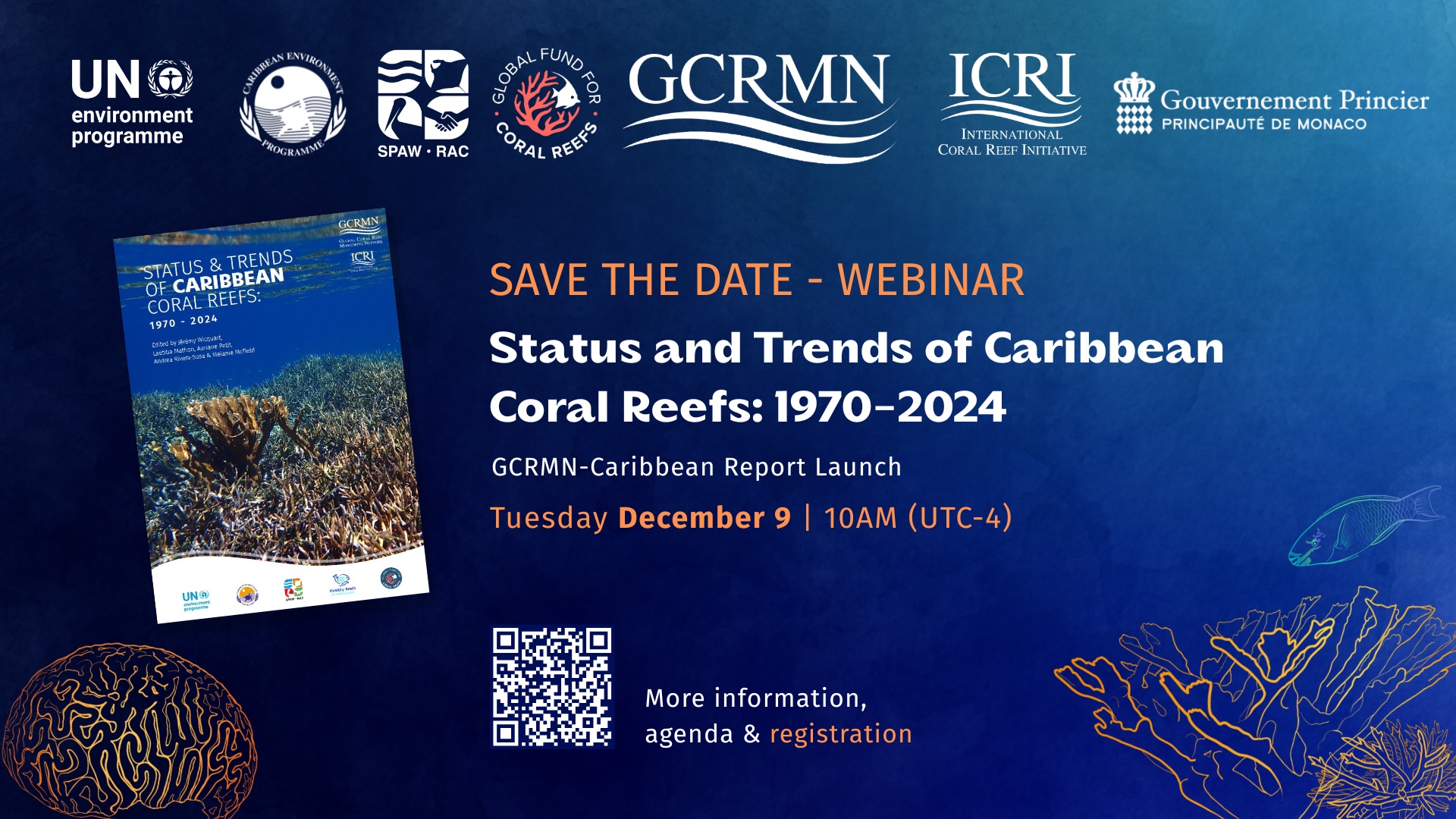
SPAW-RAC / UNEP-CEP, the Global Coral Reef Monitoring Network (GCRMN), and the International Coral Reef Initiative (ICRI), with contributions from the Healthy Reefs Initiative, the Global Fund for Coral Reefs, and the Government of Monaco.
Launch of the GCRMN’s Status and Trends of Caribbean Coral Reefs: 1970-2024
Coral reefs are the lifeblood of Caribbean island and coastal communities, supporting livelihoods, food security, and cultural heritage. Yet these vital ecosystems face mounting pressures from climate change, pollution, and unsustainable practices. Understanding their current condition and the drivers of change is essential to guide effective action.
This 90-minute webinar will unveil the findings of the new Global Coral Reef Monitoring Network (GCRMN) Status of Coral Reefs of the Wider Caribbean: 1970–2024 report — the most comprehensive assessment of Caribbean coral reefs to date. Developed through the collaboration of more than 200 scientists from across the region, from Cuba to Colombia and Barbados to Mexico, the report combines decades of field data with new machine-learning analyses to identify regional trends, threats, and management priorities.
Join experts and report authors as they discuss:
- Regional results and ecological trends
- Key threats and pressures affecting reefs
- Case studies on coral disease and bleaching
- Recommendations to move from science to policy and action
The webinar aims to engage the wider conservation community in understanding and sharing these findings to strengthen coral reef protection across the Caribbean.
Languages: English & Spanish (live interpretation provided)
Organised by: SPAW-RAC / UNEP CEP, the Global Coral Reef Monitoring Network (GCRMN), and the International Coral Reef Initiative (ICRI), with contributions from the Healthy Reefs Initiative, the Global Fund for Coral Reefs, and the Government of Monaco.
The registration for this webinar will be managed through Luma.
Here’s how it will work:
- Registration: When attendees register through the Luma event page, they will not receive the Zoom link immediately. This is normal and part of the setup for this particular webinar.
- Zoom Link & Event Access: The Zoom link will be released closer to the event date. This will be shared via a ‘news blast’ sent to all registered participants. The email will include the Zoom access link and any final updates or materials related to the webinar.
- Why This Process? We’re using Luma to streamline communication and consolidate updates in one place. By sending the Zoom link closer to the date, we can ensure participants receive the most up-to-date information, avoid confusion, and increase event security.
- Reminders: Registered attendees will also receive automated reminders from Luma as the event approaches, ensuring nothing is missed.
English and Spanish interpretation provided
Should you have any questions or need more information, do not hesitate to contact the ICRI Secretariat
Tuesday 9th December 2025
Agenda
Opening remarks
Christopher Corbin, UNEP-CEP
Presentation of the new report:
Regional Analysis Results
Lucie Labbouz, SPAW-RAC
Threats to coral reefs in the Caribbean
Laetitia Mathon, GCRMN-Caribbean Consultant
Status and trends of Caribbean coral reefs
Jeremy Wicquart, MAREPOLIS
Case studies
Insights from Mesoamerican Reef Fish in Marine Protected Areas
Andrea Rivera Sosa , Coral Reef Alliance
The value of a joint coral-monitoring program to improve coral restoration
Aldo Croquer, The Nature Conservancy
Report Recommendations
Melanie McField, Healthy Reefs Initiative
From scientific recommendations to political action
Yabanex Batista, Global Fund for Coral Reefs
Perspectives from the International Coral Reef Initiative and the Status of Coral Reefs of the World: 2025
Tom Dallison, ICRI Secretariat & Co-lead – Status of Coral Reefs of the World: 2025, GCRMN
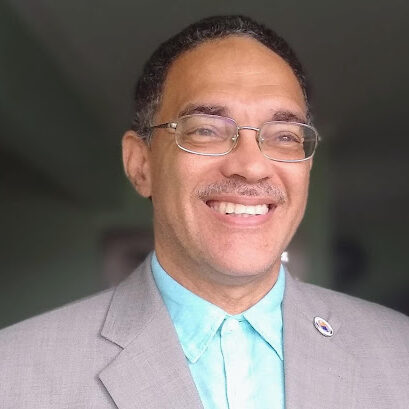
Christopher Corbin
UN Environment Programme Caribbean Environment Programme (UNEP-CEP)
Christopher Corbin is the Coordinator of the UNEP Cartagena Convention Secretariat in Kingston, Jamaica. With over 30 years in environmental governance, he has led major reforms advancing regional cooperation on marine pollution, oil spills, and biodiversity protection. He has strengthened inter-regional partnerships on nutrient management, marine protected areas, and sargassum response, while promoting digital transformation and stakeholder engagement. A former Saint Lucia delegate to global environmental forums and a published author, Christopher continues to champion Caribbean leadership in global ocean policy and governance.

Lucie Labbouz
Regional Activity Centre for Specially Protected Areas and Wildlife (SPAW-RAC)
Lucie Labbouz works in nature conservation with a focus on tropical ecosystems in the Caribbean, where she has been based for the past eight years. She is currently involved in several projects related to protected areas under the SPAW Protocol and coordinates the SPAW Protected Areas Managers Network, supporting collaboration and knowledge sharing across the region. Lucie served as Co-Chair of the GCRMN-Caribbean in 2018 & 2019, during which she organized trainings on biophysical and socmon reef monitoring in Saint Martin and Jamaica, using GCRMN-Caribbean Guidelines. For this webinar, she is representing her colleague Auriane Petit, who has coordinated, since 2024, the collaborative work leading to the preparation of the Status and Trends of Caribbean Coral Reefs: 1970–2024 report.

Laetitia Mathon
GCRMN-Caribbean
Dr. Laëtitia Mathon is a tropical marine ecologist with a strong interest in understanding how environmental changes shape coral reef and fish communities. Her research combines environmental DNA, field monitoring, and spatial ecology to explore biodiversity patterns and support science-based conservation. She has contributed to projects on coral reef health, coastal resilience, and marine biodiversity assessment across tropical ecosystems, and is actively engaged at the regional level through collaborations and working groups dedicated to the protection of Caribbean marine habitats. Laëtitia also engages in education and outreach to foster local involvement in marine conservation and sustainable ocean management.

Jérémy Wicquart
GCRMN-Caribbean
Dr. Jérémy Wicquart is a marine ecologist specializing in the temporal dynamics, disturbances, and resilience of coral reef ecosystems. He currently serves as the technical coordinator of the Global Coral Reef Monitoring Network (GCRMN). In this role, he has contributed as an editor to several GCRMN reports, leading data integration and analysis, participating in the writing, and coordinating the editorial process. His work focuses on understanding how coral reef ecosystems respond to environmental change and on strengthening global monitoring to inform effective conservation and management.
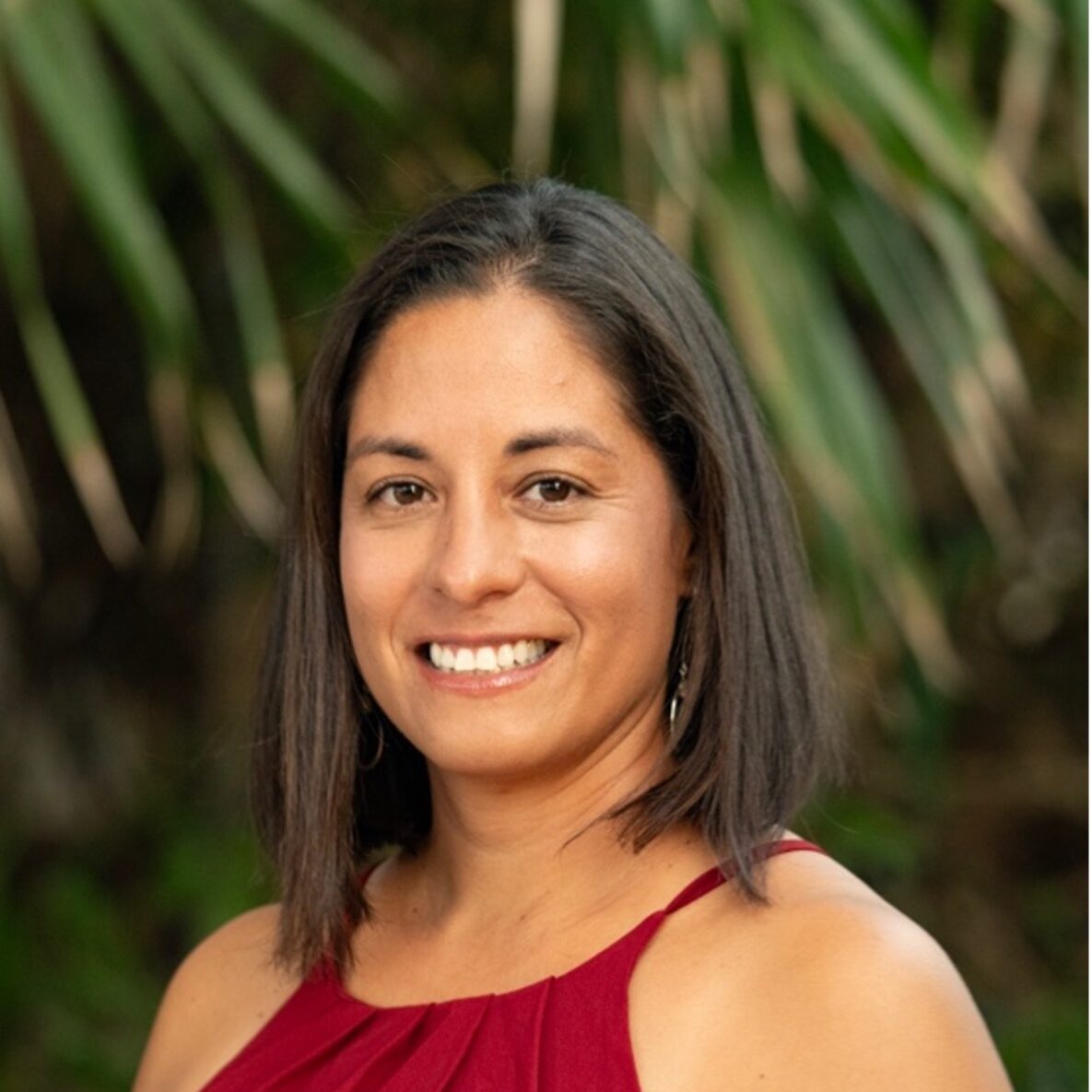
Andrea Rivera Sosa
Coral Reef Alliance
Dr. Andrea Rivera-Sosa is a marine biologist with over 13 years of experience in coral reef ecology, monitoring, and conservation across the Mesoamerican Reef Region. As Science to Policy & Practice Manager at the Conservation Science program at Coral Reef Alliance, she strengthens the connection between science, field implementation, and global policy. She contributes to regional and international coral conservation through the IUCN Caribbean Coral Specialist Group. She also serves as a Guest Researcher at El Colegio de la Frontera Sur in Chetumal, Mexico, where one of her main projects includes supporting the Global Coral Reef Monitoring Network (GCRMN)-Caribbean and the forthcoming regional coral status and trends report to inform management and resilience strategies.
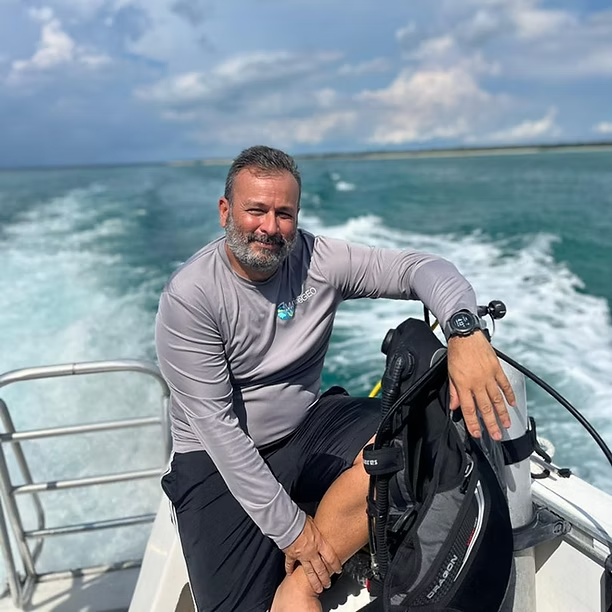
Aldo Croquer
The Nature Conservancy
Aldo Croquer is a Coral Reef Ecologist graduated from Simon Bolivar University in 2004. He worked as full professor for 12 years before moving into the Dominican Republic to work for TNC as the Marine Conservation Program Manager for the Central Caribbean. Aldo has worked for over 28 years supporting local and regional monitoring programs, including CARICOMP, MarineGeo and Monitorea across the Caribbean region. With over 97 publications in peer-reviewed journals he has dedicated his career to study the dynamics of coral diseases and the impact of human stressors as drivers of coral reef trajectories. During the past six years, he has gained interest on coral restoration from an experimental ecology perspective. More specifically he is using his expertise on coral reef monitoring to plan and adapt coral restoration programs to different challenges.

Melanie McField
Founder and Director of the Healthy Reefs for Healthy People Initiative (HRI)
Melanie McField is the Founder and Director of Healthy Reefs for Healthy People (HRHP), which produced the world’s first coral reef Report Card almost 2 decades ago with a collaboration of >70 partner organizations working in the Mesoamerican Reef. She has participated in the GCRMN for 30 years and now serves as the co-chair of the GCRMN Caribbean Steering Committee. Her research has focused on coral bleaching, marine contaminants, MPA management effectiveness, restoring herbivory and other management interventions to improve reef health and resilience. Melanie has >60 peer reviewed research papers, numerous book chapters, technical and public-interest publications and has mentored 14 graduate students. She has received several awards, including the 2021 Conservation Award from the International Coral Reef Society and participated in numerous television news broadcasts and nature-based documentaries to broaden support for reef conservation awareness.
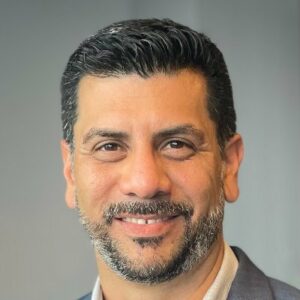
Yabanex Batista
Deputy Director of the Global Fund for Coral Reefs (GFCR)
Yabanex Batista is the Deputy Director of the Global Fund for Coral Reefs (GFCR), the first UN fund dedicated to SDG 14, Life Below Water. With more than 20 years’ experience, he has focused his career on international financing institutions and sustainable financing for conservation and development, government relations and policy, and multilateral environmental agreements. Prior to joining GFCR, Mr. Batista was chief executive officer of the Caribbean Biodiversity Fund, and he worked for GITEC/GIZ (German Government Technical Cooperation Agency) in Mexico, The Nature Conservancy’s international government relationships department and Europe office, the World Bank-GEF Unit, the United States Geological Survey, and IPAM (Amazon Environmental Research Institute) in Brazil.

Tom Dallison
International Coral Reef Initiative (ICRI) / Global Coral Reef Monitoring Network
Tom Dallison is the Senior Project Manager at Blue Pangolin Consulting, specialising in coral reef conservation, effective marine resource management, and international policy. He is forms part of the International Coral Reef Initiative (ICRI) Secretariat and co-lead of Global Coral Reef Monitoring Network’s (GCRMN) Status of Coral Reefs of the Word: 2025 report. With expertise in area-based management tools, and biodiversity policy, Tom has delivered impactful projects globally, including capacity-building tools for managers and practitioners, and sustainable financing for marine conservation. He also serves on multiple IUCN committees, including IUCN WCPA and the IUCN SSC Coral Specialist Group.